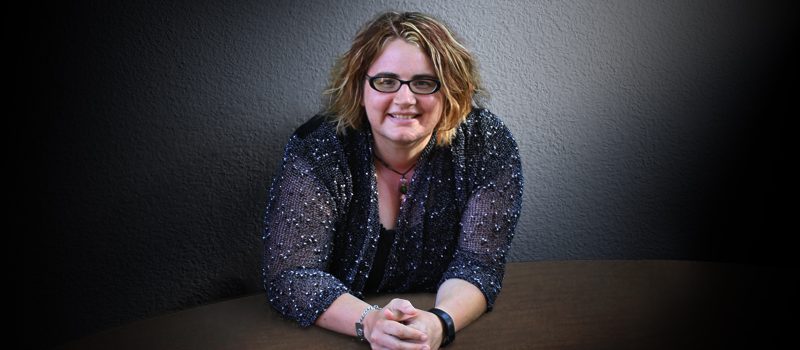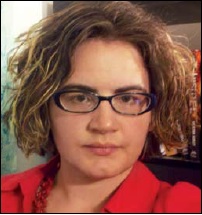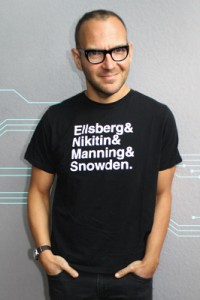Kameron Hurley:The Status Quo Is Not a Neutral Position: Fiction and Politics
I often find myself getting asked tricky questions from new writers, but the trickiest of all is this: they want to know how I’ve managed to have a career while speaking so publicly about my beliefs and values online.
I’ve been writing on the internet since 2004, and publishing in more traditional venues since 1996. And I have a distinct set of values and politics and opinions that I bring to both my fiction and nonfiction work, of course.
Doesn’t everyone?
I explore a variety of topics quite boldly on the page, and make good use of tactical swearing. I’ve had my non-fiction work recognized with two Hugo Awards, and garnered a solid online following for speaking honestly and publicly about both my values and the realities of the writing and publishing life.
Yet one of the things I’ll hear from newer writers, and even my colleagues, is that they avoid potentially polarizing topics when writing both online and in more traditional print magazines like this one. They fear turning off a certain subset of readers. What many don’t realize is that our values are quite apparent even in our fiction – it’s in whether or not we choose to portray the status quo as heroic and normal, or challenge it. It’s in how we treat our male and female characters, and whether or not we acknowledge that there are people living between those two binary boxes. It’s in how we build future and imaginary worlds, and who we choose to put in charge of them, and how they organize themselves. It’s in whether we believe, or not, in good and evil, in a creator(s), or not. It’s in who we say our heroes should be. It’s all there, everything we believe, painted right into our stories, whether we like it or not.
Truth be told, the readers you will lose by saying all that out loud are likely going to be the same ones you would lose simply because they were turned off by your fiction.
The newer writers who approach me tend to be people who believe passionately and fervently in their sets of values, folks who feel that their work, specifically, has been called out as ‘‘political’’ while the work of their peers seems to not ruffle any feathers. I always found this strange, when people told me that the only ‘‘political’’ fiction out there was written by folks at the far left or right of the spectrum, and that somehow, the work that maintained, presented, or celebrated the status quo was free of icky sticky politics.
Oddly enough, it seems many consider fiction that upholds the status quo, that supports current politically acceptable or traditional views, as apolitical. It is, somehow, ‘‘normal,’’ and it’s the rest of us working around the margins of that that are making all the fuss. We’re muddying the clear waters. All our science fiction and fantasy should be ‘‘fun’’ people tell me. Free from anything outside the accepted norm.
Which, you know, for writers in genres which are supposedly ‘‘fantastic’’ is a deeply amusing assertion.
I expect these folks who think pure genre fiction is free from politics think we should just write about a post-racial capitalist utopia, where men are men and women are women. Because writing such a thing is not a statement of politics or morals or values, but of cold, objective fact.
Right?
But all writing is political. All art is political. If we choose to write from the viewpoint of the status quo, of ‘‘accepted’’ views of history, of gender roles, of economics, of race relations and commerce, that does not make our work any less political. It’s simply that those politics are less visible to us from where we’re sitting, because those are the politics the media feeds us, the ones the talking heads prop up, the ones the schools that were raising good little factory workers told us were not political at all, but human, and normal. They told us these views, these positions, were fact, and anything that veered from that was disruptive.
And to be disruptive, to stand out, was a grave crime indeed.
That’s us. The disruptors.
What we choose to write about – violent matriarchies, benevolent patriarchies, anarchist utopias, capitalist dystopias – cannot help but take a political position. Hierarchy is good. Capitalism is bad. Binary gender is natural. Bisexuality is natural. Or not. Freedom of information is bad. Freedom of information leads to terrorism. The state is benevolent and should be trusted to protect its citizens. The state is corrupt and must be abolished.
Intentional or not, our work expresses a certain set of values. The more they tilt away from the accepted cultural ‘‘norm’’ of values, the more visible they will be, but they’re no more or less valid expressions.
It turns out that science fiction and fantasy writers have a long and glorious tradition of political rambling, political writing, and both challenging and propping up the status quo. Heinlein’s work was deeply political, as was the work of Ursula K. Le Guin, Samuel R. Delany, Joe Haldeman, Joanna Russ, Octavia E. Butler – throw a dart at a book in your library or swipe through your e-book selections and you’ll find a writer who expresses a certain view of the world, whether it’s in conversation with or directly challenging the society they’re writing from.
New writers tend to have a deep fear of saying something wrong on the internet, and I don’t blame them – things can escalate quickly. But it is not so much the flame wars or hater comments they seem to fear, but the idea that particular editors, or publishing professionals, or colleagues won’t work with them if they know what their politics are.
And to that, I say, well, you know, as long as your ‘‘politics’’ aren’t about kicking puppies and taking away women’s right to vote and stomping on all other races and countries but your own and stripping people of their human rights, you’ll probably do fine. There is a long history of writers who have done all those things, and still managed to have careers. So you’ll be all right.
It’s true that sharing certain values with the people you work with would be nice, but at the end of the day, if you write compelling stories that people want to read, folks will work with you, even if you’re a jerk online. I know quite a few jerks online who continue to do very well for themselves. Better, however, are those with strong political opinions who are still deeply gracious, thoughtful, and compassionate human beings whom I can respect despite our differing opinion on social services and tax law.
As writers, all we have is our unique voices, views of the world, and, importantly, our passion. I write with passion. It powers everything I write. If I fear to give voice to that passion because people disagree with me, then I’m finished before I’ve ever begun, because, let me tell you, new writers – if you cannot endure criticism of your opinions, you will not be able to stand up to the criticism of even one scathing review which calls you a gutless hack. And you will get those reviews. Again and again. No matter how many awards you win or copies you sell or how much or how little you speak honestly about your politics.
So speak up. Speak loudly. But recognize that when you choose your position, you must choose it wisely. Because there’s a very good chance that we’re all going to be listening.
What have you got to say?



 From the
From the 



“If you’ve gotta message, use Western Union.” Obvious enough to be a cliche, of course, but a story has to be *entertaining.*
It’s certainly a good idea to write from a specific point of view. But a good story needs plot, characters, conflict, resolution…all that stuff. If the writer has done the job right, the reader will “get it.” Too many writers who do tackle the controversial topics lay it on with a trowel, and often neglect story values—and that defeats the purpose.
In the interests of honesty, I’m not sure I’ve read anything by Kameron Hurley; I can’t judge her works if I haven’t read them. I speak generally, both as a (would-be and so-far-failed) writer, and a (long-time) reader. But particularly the latter—you’ve gotta entertain me to get your point of view across.
I’ve been teaching a basic literature class at Urbana University in Urbana, OH, for over 20 years, and in the process of trying to get my students to understand what a critical source is, I ran across an article that claimed that any poet who tries to make political comments in his/her poetry will ruin the poem. That remark was made about Langston Hughes’ poem “Harlem.” “Harlem” is about as political as you can get, and yet it still works as a poem. So does Adrienne Rich’s “Living in Sin,” and Linda Pastan’s “Jump-Cabling,” and Gwendolyn Brooks’ “The Mother,” which are all political. Perhaps an author’s politics aren’t a ‘conscious’ addition to a work, but honest writing reflects an author’s core values, intentionally or otherwise. And all of us need to have our core values challenged on a regular basis; how else can we assess how we truly stand on an issue?
Robert, I have read her work, all three novels in her “Bel Dame Apocrypha.” Are they entertaining? Yes, but then, I’ve been reading SF & F since I was 12, or over 50 years, and that’s what I prefer to read over anything else. Kameron’s books are definitely contemporary; it’s difficult for me to feel empathy for a bisexual assassin (I’m a hetero English prof), but her conflicts and characters are well-drawn and her world incredibly detailed and alive. She has some new work I can’t yet afford (I borrowed the trilogy through my college’s interlibrary loan policy), but I will definitely find an opportunity to do so in the next few months.